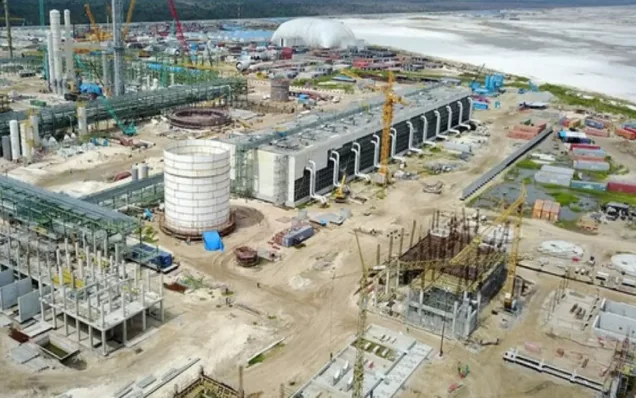The Dangote refinery is an integrated petrochemical refinery situated in the Lekki Free Zone, Lagos State. It has a capacity of 650,000 barrels per day (c. 159 liters per day) and the management plans to process about 540,000 barrels per day in the first phase of its operations, ramping up to 650,000 barrels per day subsequently.
The project will be Africa’s biggest oil refinery and the world’s biggest single-train facility, with the Organization of Petroleum, Exporting Countries (OPEC) projecting that the Dangote refinery would account for more than half of Africa’s expected total distillations in the medium term. The refinery will mainly produce gasoline, but also some quantities of diesel and jet fuel.
After many delays since 2016 when the project started, the refinery is expected to commence operations by mid-2023 and is said to be 97% complete. The petroleum refinery can meet all of the requirements all of the gasoline (PMS), diesel (AGO), kerosene (DPK) and aviation jet fuel (Jet A-1).The NNPC has a 20% stake in the project. Chief executive of the Nigerian National Petroleum Company, Mele Kyari, notes that the NNPC will stop importing refined products once the refinery commences operations. He also notes in news reports that the NNPC will sell 330,000 barrels-per-day minimum by right for the next 20 years and has acquired the right to purchase 20% of production from the plant.
The impact of the commencement of this refinery on the nation’s economy cannot be overemphasized and we discuss a few here.
Foreign exchange implication
A major problem the country has faced in recent years is the continuous devaluation of the Naira amidst a shortage of supply and growing demand and many look to the commencement of operations at the refinery as a reprieve. While it is not completely certain if the refinery will have a significant impact on Nigeria’s foreign exchange through import substitution, we are more concerned about the possibility of earning foreign exchange through the export activities of the refinery. Judging by comments from Mele Kyari as stated above, we believe a swap agreement has already been agreed upon. 330,000 barrels per day in exchange for 20% of production from the refinery. In essence, this appears net neutral for FX. Moreover, while the country will no longer need to import refined petroleum, it also implies reduced crude oil exports. However, the Governor of the Central Bank of Nigeria, Godwin Emefiele noted in news reports that the oil refinery will save Nigeria 30% of foreign exchange needed for petroleum products importation. We also expect export proceeds from the refinery to boost reserves and FX liquidity. The CBN’s RT200 program will likely receive a significant boost from the refinery’s export activities.
Availability of the product and an end to persistent fuel scarcities
For most of 2022, the country witnessed a scarcity of petrol which increased the hardship of motorists who were forced to spend hours in the sweltering heat, waiting in line for fuel, thereby losing productive man-hours. Different reasons were given for the scarcity during the year, from about 100 million liters of contaminated fuel imported into the country by the Nigerian National Petroleum Corporation (NNPC) and its related firms to trucks of fuel left stranded on the roads due to bad roads which were affected by the rains. Intermittent fuel scarcity has been a recurring theme for the country over the years, worsened after NNPC became the sole importer of the product. Nigeria’s hope of attaining self-sufficiency in the local domestic oil refining space might just rest largely on the operations of the Dangote refinery. The refinery, which has one of the largest production capacities in the world, operating at full capacity would more than meet Nigeria’s domestic fuel requirements (estimated at 66.8m liters a day according to the the Nigerian Midstream and Downstream Petroleum Regulatory Authority (NMDPRA)) with excess capacity for exports. While we note that achieving self-sufficiency in local refining capacity might not reduce the cost of petrol significantly, sufficient local refining capacity would at least boost the availability of the product and bring a lasting end to the persistent issue of fuel scarcity in the country.
A possible end to subsidies
The Federal Government has announced the removal of fuel subsidies in 2023 and has urged Nigerians to prepare for higher fuel prices that will follow. Though we realize how politically sensitive this discourse is, we see no option for the incoming government amidst a tight fiscal space. Undoubtedly, an attempt to revise the price to suit current realities will be strongly resisted by the populace who have been hard hit by two recessions and a pandemic in the last 7 years amid rising food and utility costs, making us believe the elimination of the subsidies will be gradual starting possibly from the second half of the year.
Given the proposed removal of petrol subsidy, we envisage the impact of domestic refining of petrol on PMS pump price will not be too significant, given that only the freight cost is expected to reduce, implying subsidies will still be required if current realities remain the same. According to the last PMS pricing template released by the NMPDRA early 2021, freight cost was estimated at N6.51/litre, 3.4% of the then landing cost of N189.61/L. However, the start of operations can give the government some room to begin the deregulation conversation again.
Employment opportunities
With current unemployment rate of about 33%, Dangote refinery when fully operational can provide 135,000 permanent jobs in the region. Last year, the President of Dangote Industries Limited, Aliko Dangote disclosed plans to increase the human capacity at the Dangote Refinery Project site from 40,000 to 57,000 personnel from 29,000 Nigerians and 11,000 foreigners that were in employment at the time.
CSL ResearchSource:












